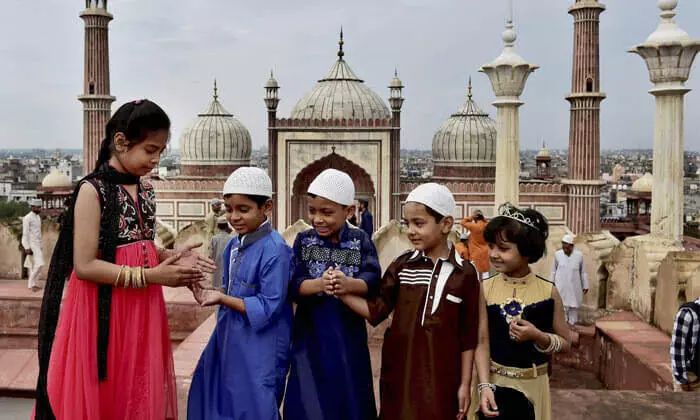Eidi is more than just cash, gifts; it’s the right of every Muslim child
Eidi is given till the third day of Eid by visitors who come to greet their relatives and friends
By Newsmeter Network
Hyderabad: The Muslim society has no concept of Santa Claus who distributes gift hampers among the children, but every Muslim child gets a handful of cash in the form of Eidi on Eid from their families and even from strangers sometimes. Eid brings happiness, joy, and cheerfulness to children as their pockets are swollen and they have the liberty to spend the amount they earn as Eidi as per their wishes or keep them as savings. Most of them purchase toys of their choice with the amount they get from their elders in the form of Eidi (a token gift by elders to children on the day of Eid).
Eidi: The right of every child
This Eidi is considered the right of every child and a desire of the damaad (son-in-law) on the occasion of Eid particularly on Eid-ul-Fitr. Usually, on the occasion of Eid, cash is given as a gift, sometimes family members give it in the form of attractive gadgets, vehicles, and other useful items as per the wish of their wards.
Eidi is an intimate custom, which is probably inspired by the kings of older times, who used to distribute vast sums of money, liberate prisoners, or exempt taxes on the occasion of Eid or special celebrations of their dynasty. This tradition is comfortably continued in the present era. On returning from Eidgahs (open ground meant for Eid congregational prayer), children do salam by raising their right hand and touching their forehead and greeting the elders with the hope of getting Eidi. They get Eidi from every elder member of the family and relatives and family friends who visit on the occasion of Eid to greet each other and vice versa, on paying them a visit along with their elders.
This Eidi is given till the third day of Eid by visitors who come to greet their relatives and friends. Children seek Eidi from every elder member of their family like grandfathers and grandmothers, uncles and aunts (both paternal and maternal) apart from their father and mother. Before Eid, elders keep a wad of crisp currency notes of different denominations with them to distribute as Eidi to children on Eid day. Most of the children keep golak (till/money bank) with them for collecting the Eidi.
They accumulate the entire collected amount as Eidi and buy different items, particularly toys as per their choice. Some children purchase items on Eid day itself while some children keep this amount to purchase items later. Commonly, children have been barred from seeking money from relatives and family friends, but they got the liberty to seek Eidi openly on the occasion of Eid and it is not considered an indecent act.
Children give grades to Eidi givers like enviable, very generous, generous, humble, miser, and niggard based on the amount they received as Eidi. Even children treat them accordingly.
It is a custom in the Indian continent of sending Eidi by in-laws to the son-in-law. Mostly, parents send clothes and cash wrapped in a gift hamper to their married daughter and her husband and children. Even as the son-in-law expects costly gifts from in-laws for a few years of their weddings, but with passing years their desires also fade.
Syed Fardeen, an undergraduate student from Nampally, said this time he plans to buy a new smartphone from the money he will collect as Eidi. In case he receives a meagre amount, he will ask his father to pay the rest. He says, “Last year, I spent the Eidi amount on purchasing shoes and apparel for my cousin’s weddings. Now my plans are slightly big this time, hoping this year I will get an attractive Eidi.”
Remembering his childhood days, Mohammed Shakeel, an advocate from Old City, recalls how in those days, they used to be very happy if someone gave them two or five rupees as Eidi, and if anyone gave 20 or 50 rupees, then they would jump up and down. He says, “Those days were very nice when we used to buy toys in heaps for five rupees. I remember very well that every time I was inclined to bring toys for my younger brothers and sisters while returning from Eidgah.”